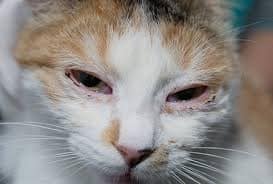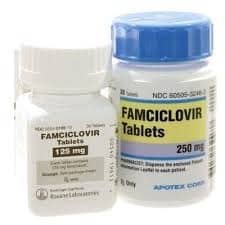
The conjunctiva are the pink part under the eyelids and the eyelid lining. When they are irritated, they redden and can become itchy, dry, and uncomfortable. The cornea, or clear dome-like covering of the eye, can become involved in the inflammation. It can become cloudy or even ulcerated. Tear production can be reduced leading to a chronically dry, uncomfortable eye.
Conjunctivitis in cats is typically of viral origin and usually that means a herpesvirus infection. In cats, it’s a respiratory and eye issue unlike how it presents in people.
All species that get herpes do have things in common: Herpesviruses grow in the tissues of the body. The infection begins with an initial phase that is usually the most severe in terms of symptoms. This phase resolves but the virus itself does not go away; instead, it retreats into a latent period where it remains dormant until a stressful event ‘awakens’ it.
In times of stress, the immune system is taxed and the virus is able to begin replicating inside the tissues it lives in. The result is the return of symptoms. In this way, the infection is permanent but the symptoms of the infections come and go.
In cats, symptoms of herpes include conjunctivitis as described above but also nasal and respiratory symptoms such as sniffles, runny nose, and fever, basically the symptoms of a bad upper respiratory infection.
As mentioned, the first episode is generally the worst and subsequent episodes are more mild, especially with regular vaccinations that can help reduce duration and severity of disease.
Young Kittens with Herpes
As mentioned, herpes infection typically causes respiratory signs. In the young animal such as the kitten, these signs can result in life-threatening loss of appetite and dehydration. Kittens (or adult cats) with obvious discomfort should be examined by a veterinarian.
Systemic antibiotics will most likely be needed and sometimes hospitalization for very severe cases to provide proper supportive care. Herpes infection is extremely common in young kittens, especially those facing other stresses (fleas, poor nutrition, environmental cold etc.).
Adult Cats
Since kittens are so commonly affected with herpes, it is not unusual to find oneself in possession of an adult cat with a history of herpes infection. These individuals will have recurring conjunctivitis in times of stress. Typical signs include squinting slightly in one eye, a noticeable increase in eye discharge (usually brownish in color), redness of the conjunctivae, or all of the above.
How do we Know it is Herpes?
There are several feline infectious diseases that can cause conjunctivitis: basically all the agents that contribute to feline upper respiratory infection also cause conjunctivitis. Frequently they are present in combination.
For feline patients that have mild symptoms and who recover quickly, often no diagnostics are warranted. However, if pneumonia is present or a bad fever, then it can be helpful to swab the back of the thorat and the conjunctiva and run a test called PCR, which is really a process that amplifies DNA and reveals what type of infection is present.
Again, for mild symptoms, if a cat has a respiratory infection along with conjunctivitis, it’s likely that the culprit is herpes.
How Do We Treat Herpes?
There are several treatment methods that can be combined in the treatment of feline herpes eye infections.
Topical Antibiotics
Topical antibiotic drops for the eye reduce bacterial invaders and are helpful in controlling the severity of symptoms that frequently complicate Herpes conjunctivitis. It is important to realize that antibiotics do not affect the herpesvirus itself; they only work on secondary bacteria; however, often this is enough to make the cat comfortable until the virus goes dormant.
Topical Anti-virals
If topical antibotics are not enough, there are several eye drops available that act directly against the herpesvirus. They include: idoxuridine (no longer commercially available and must be obtained from a compounding pharmacy); Viroptic® (trifluorothymidine); cidofovir (which also must be obtained through a compounding pharmacy); and Vira-A® (vidarabine). These medications are relatively expensive and typically need to be given five times daily with the exception of cidofovir, which accumulates in the eye tissues and allows for twice daily dosing.
Oral Anti-virals

While antibiotics have been around for decades, antiviral medications have been much more elusive. Famciclovir was developed as a herpes treatment for humans and has been found effective for feline herpes as well.
While doses and protocols are still being worked out, higher doses of oral famciclovir translate into therapeutic famciclovir levels secreted in tears, effectively creating a topical treatment from an oral product. Because the topical antivirals are frequently inconvenient to use, oral famciclovir combined with a topical antibiotic makes a fair approach to feline herpes conjunctivitis. It should be noted that this medication is usually reserved for severe cases that don’t resolve with the other-mentioned methods.
It should be noted that some infections lend themselves to prevention by the vaccination process and others do not. Herpes rather does not; this means that vaccination of healthy cats does not prevent infection for feline herpes; what it does do is lead to less severe signs. Vaccination against feline herpes has been deemed helpful but one should understand that, in this case, the goal is not total prevention of infection but palliation.
Can Humans get Feline Herpes? Can Cats get Human Herpes?
Thankfully, humans and cats cannot share their herpes viruses. Feline herpes is contagious among cats only and human herpes is contagious among humans only.


